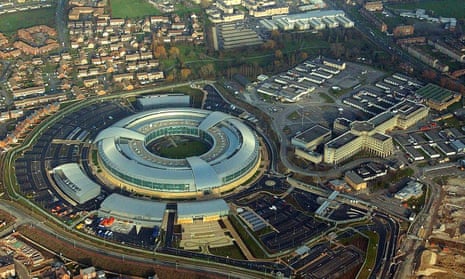The first major challenge to the legality of UK intelligence agencies intercepting private communications in bulk, following Edward Snowden’s whistleblowing revelations, is due to be heard by the European court of human rights (ECHR).
Three separate British cases brought by civil rights groups will be considered together by seven judges in Strasbourg on Tuesday, raising questions about the way GCHQ, MI5 and MI6 share surveillance material with the United States and other foreign governments.
One of the claims, brought by an alliance of 10 human rights organisations, has been considered by the investigatory powers tribunal (IPT) in London, which takes some of its evidence in secret.
The tribunal has already ruled that in the past the UK surveillance regime was unlawful because it breached the right to privacy under article 8 of the European convention on human rights – but that it was now compliant.
The tribunal also found that GCHQ, the government’s eavesdropping agency, spied on Amnesty International and the South African non-profit Legal Resources Centre by retaining and illegally examining their data.
The other two claims at Strasbourg, brought by Big Brother Watch and the Bureau of Investigative Journalism, have gone directly to the ECHR. They involve allegations that government interception breaches freedom of expression and the right to a fair trial, on the grounds that the IPT’s hearings are held partially in secret and do not provide an effective domestic remedy.
The coalition of NGOs includes Liberty, Amnesty International, Privacy International, the American Civil Liberties Union and groups from Pakistan, South Africa and Egypt. The Big Brother Watch case is supported by the Open Rights Group and English Pen.
They all argue that cross-border programmes deployed by government agencies to intercept and access communications content and data on an international scale are unlawful.
Their communications are likely to have been spied on, they maintain, violating their rights to privacy and freedom of expression while jeopardising confidentiality and the protection of the vulnerable sources and informants with whom they regularly deal.
The Strasbourg hearings will focus on the bulk interception programmes revealed by Edward Snowden in 2013, including Tempora, Upstream and Prism. Tempora enables GCHQ to intercept and store a back-up of internet activity entering and leaving the UK through fibre optic cables for subsequent inspection; Upstream allows the United States’ National Security Agency (NSA) to carry out similar operations in the US; and Prism lets the NSA access communications passing through US companies such as Microsoft, Apple, Yahoo!, Google, Facebook, Skype and YouTube.
GCHQ defends its practices on the grounds that the only way to target terrorist or criminal suspects is “to intercept a substantially greater volume of communications ... and then apply a selection stage to identify the communications in question”.
The Cheltenham-based agency makes a distinction between intrusive “mass surveillance”, which it insists it does not undertake, and “bulk interception” of electronic communications, which it says is necessary in order to carry out targeted searches of data in pursuit of terrorist or criminal activity.
In response to submissions made ahead of the hearing by Big Brother Watch, a UK government representative said: “The interception of a communication as it flows through a fibre optic cable does not entail a substantial invasion of privacy ... unless that communication is selected for examination: in other words, unless a human examines it or may potentially examine it.”
The eventual judgment is likely to have implications for last year’s Investigatory Powers Act, which changed the UK’s legal framework governing surveillance.
Nick Williams, Amnesty International’s senior legal counsel, said: “This case concerns the UK, but its significance is global. It’s a watershed moment for people’s privacy and freedom of expression across the world.”
Martha Spurrier, director of Liberty, said: “Our organisations exist to stand up for people and challenge abuse of power. We work with whistleblowers, victims, lawyers, journalists and campaigners around the world, so confidentiality and protection of our sources is vital.
“The UK government’s vast, cross-border mass surveillance regime – which lets it access millions of people’s communications every day – has made those protections meaningless.”
Scarlet Kim, Privacy International’s legal officer, said: “These practices are unlawful and violate the fundamental rights of individuals across the world, assailing privacy and chilling thought and speech. They are incompatible with open and democratic societies.”
Rachel Oldroyd, of the Bureau of Investigative Journalism, said: “Without adequate restrictions, the interception and mass collection of communications data by the UK government’s surveillance operations, such as those carried out by GCHQ, restricts the operation of a free press, and this has a chilling effect on whistleblowers seeking to expose wrongdoing.”
Griff Ferris, of Big Brother Watch, said: “UK citizens who are not suspected of any wrongdoing should be able to live their lives in both the physical and the digital world safely and securely without such government intrusion.”
